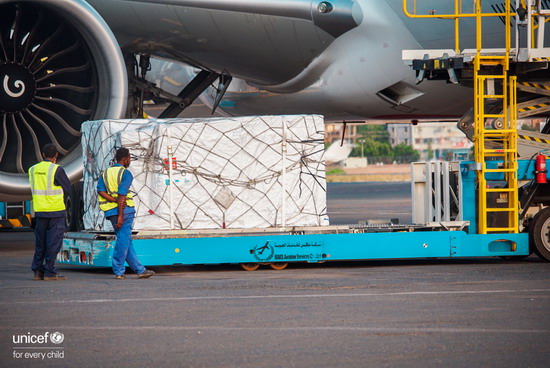
Khartoum, 4 October 2020 – On 1 October, UNICEF delivered nearly 10 million doses of polio vaccine to Khartoum. These vaccines will be used for a national polio campaign in Sudan planned for October to immunize 8.6 million children under the age of 5.
On 8 August, vaccine-derived poliovirus type 2 (cVDPV2) was confirmed in Sudan. This strain of poliovirus is the result of low immunity and under-immunization of communities, rather than a problem with the vaccine.
The vaccination campaign, the first to be held nationwide in response to the virus detection, is being led by the Federal Ministry of Health, and supported by WHO and UNICEF. The aim is to boost immunity and protect vulnerable children against the virus. Both WHO and UNICEF are advising health workers and caregivers to observe strict health and safety measures against COVID-19 during the campaign.
“UNICEF with partners is supporting local authorities to control the spread of polio, as part of these efforts we have procured 10 million doses of polio vaccine to support vaccination campaign,” said Abdullah Fadil UNICEF Representative. “The campaign will be accompanied by a social mobilization campaign to encourage communities to get their children vaccinated.”
Last year, UNICEF provided Sudan with 7.1 million doses of oral polio vaccine for routine vaccination activities, and 13.5 million doses of oral polio vaccine for a campaign aiming to reach 7.6 million children through multiple vaccination activities. This year, thousands of children missed out on vaccinations due to the impact of the COVID-19 pandemic on health system and communities, worsening an existing immunity gap.
“We must protect children from the threat of polio, and the best way to do that is to increase the polio vaccination coverage and urge parents and communities to bring their children for vaccination to save them from the crippling disease”, said Abdullah Fadil. “A little effort now can give children the best health care service that they need in their first years of life,” he remarked.
“Vaccinating every child is the only way to stop this outbreak spreading further,” said Dr Ni’ma Saeed Abid, WHO Representative. “The pandemic has led to lower rates of routine immunization, placing children at even greater risk. We are committed to working with parents and caregivers to deliver vaccines, and urgently raise immunity levels.”
“This is a multi-country outbreak has been active in 4 out of 7 neighboring countries with Sudan. In addition to in-country efforts we started coordination with outbreak countries bordering Sudan to have holistic and comprehensive response,” said Dr Ni’ma.
Note to editors
There are multiple strains of polio, and there is a critical distinction between wild poliovirus, which is today only found in Afghanistan and Pakistan, and the strain detected in Sudan.
Outbreak response coordinated by the Federal Ministry of Health in collaboration with partners includes special campaigns launched on media in addition to community-based mobilization.
The polio campaign is supported by the Global Polio Eradication Initiative (GPEI), an organization dedicated to the eradication of polio. The GPEI is spearheaded by national governments, the World Health Organization (WHO), Rotary International, the US Centers for Disease Control and Prevention (CDC) and UNICEF, and supported by key partners including the Bill & Melinda Gates Foundation and GAVI, the Vaccine Alliance.
For more information:
Salma Ismail
UNICEF Sudan
+249965101246
About UNICEF Sudan
UNICEF works in some of the world’s toughest places, to reach the world’s most disadvantaged children. Across more than 190 countries and territories, we work for every child, everywhere, to build a better world for everyone.
More information about UNICEF
Follow UNICEF on Twitter, Instagram and Facebook
Lina Mustapha
WHO Sudan
+249903079781
About WHO Sudan
The World Health Organization in Sudan works in close collaboration with the Federal Ministry of Health and partners to support the country in reaching its national health development goals and to ensure that all health efforts are coordinated.
More information about WHO Sudan
Follow WHO on Twitter and Facebook


